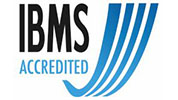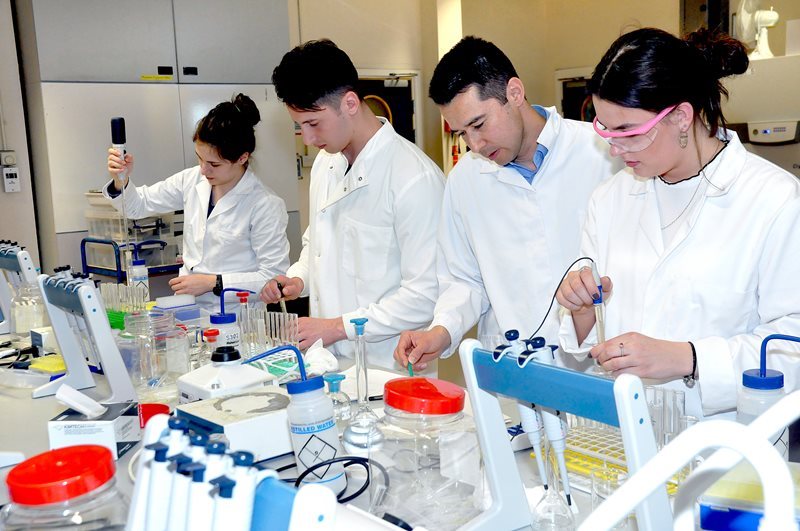Biomedical Science
BSc (Hons)
UCAS code: B900
Start dates: September 2026
Full time: 3 years (plus 1 year optional placement)
Part time: 6 years
Location: Headington
School(s): School of Biological and Medical Sciences
Overview
Perhaps you studied biology in school and it sparked an interest in how the human body works and functions. Now, you want to understand things on a deeper level. If so, our (BSc) Biomedical Science degree is for you. On the course, we grapple with big questions such as ‘How are diseases caused?’ and ‘What tools can we use to understand symptoms?’
Through a mix of academic and practical learning, you’ll gain the skills employers look for. These include lab techniques, data handling, computing, report writing, oral presentations, and teamwork. With accreditation from the Institute for Biomedical Science (IBMS), you can be confident that you’ll benefit from highly rated teaching.
The broadness of the degree opens up many possible future pathways. Using their strong links with industry, our academics have helped students find valuable work experience.
Better diagnosis means better treatment for patients. That’s the difference we’re making to people’s lives. Are you ready to join us?
Why Oxford Brookes University?
-
Teaching quality
On your physiology and clinical modules, we often use practising Clinical Scientists and Physiologists to co-deliver your module learning, helping you build an understanding of how your growing knowledge and skills are used in professional settings.
-
Professional accreditation
Continuous peer review and quality enhancement ensures educational standards that are accredited by the IBMS and can help lead to employment in the biomedical science sector, under the protected title of Biomedical Scientist.
-
Employment success
Our graduates are highly prized in the workplace. 80% of students were in work and/or study within 15 months of graduating.
-
Strong industry links
Students go on to work for local hospitals and research institutions. We also regularly welcome guest lecturers from industry.
-
Laboratory experience
Practical exercises bring key academic lessons to life. Sharpen your skills using state-of-the-art technology and equipment.
-
Additional language modules
Our university-wide language programme is available to full-time undergraduate and postgraduate students on many of our courses, and can be taken as a credit on some courses.
-
Accreditation(s)
Accredited by the Institute of Biomedical Science
Course details
Study modules
Teaching for this course takes place
face to face and you can expect around 12 hours of contact time per week, plus practicals. In addition to this, you should also anticipate a workload of 1,200 hours per year. Teaching usually takes place Monday to Friday, between 9.00am and 6.00pm.
Contact hours involve activities such as lectures, seminars, practicals, assessments, and academic advising sessions. These hours differ by year of study and typically increase significantly during placements or other types of work-based learning.
Please note: As our courses are reviewed regularly as part of our quality assurance framework, the modules you can choose from may vary from those shown here. The structure of the course may also mean some modules are not available to you.
Careers
Our (BSc) Biomedical Science degree prepares you for a career at the cutting edge of biomedical science. Alongside training you in theory and practice, many of your modules will also help prepare you for the world of professional work.
Our graduates are highly prized by industry and the NHS. This degree is accredited by The Institute of Biomedical Science (IBMS), the professional body for biomedical scientists in the UK. To become a biomedical scientist, you typically need an IBMS-accredited Biomedical Science degree like ours. You must also complete the IBMS Registration Training Portfolio in an approved laboratory, leading to Health and Care Professions Council (HCPC) registration. Further information on the Biomedical Scientist career pathway can be found at www.ibms.org
We’ll arm you with the skills you need to keep ahead in a rapidly changing workplace. Many have gone on to work in biological, clinical, pharmaceutical, or medical areas.
Popular roles include:
- biomedical scientist
- biochemist
- biotechnologist
- medical research scientist
- lab technician
- forensic scientist
- clinical research associate
- microbiologist.
Many leading universities around the world now have graduate medical schools, and this degree is also a great way to prepare for entry.
Our own MSc Medical Genetics and Genomics degree is an excellent next step for graduates, who want to explore the modern world of genetics.
Student profiles
Entry requirements
Wherever possible we make our conditional offers using the UCAS Tariff. The combination of A-level grades listed here would be just one way of achieving the UCAS Tariff points for this course.
Standard offer
UCAS Tariff Points: 112
A Level: BBC
IB Points: 27
BTEC: DMM
Contextual offer
UCAS Tariff Points: 88
A Level: CCD
IB Points: 24
BTEC: MMM
Specific entry requirements
A Level: Including one A Level or a comparable Level 3 qualification in a science subject (e.g. Biology, Chemistry, Maths, Physics).
If you do not have a background in science, we encourage you to consider our Life Sciences Foundation year.
Please also see the University's general entry requirements.
English language requirements
Please see the University's standard English language requirements.
Pathways courses for international and EU students
If you do not meet the entry requirements for this degree, or if you would like more preparation before you start, you can take an international foundation course. Once you enrol, you will have a guaranteed pathway to this degree if you pass your foundation course with the required grades.
If you only need to meet the language requirements, you can take our pre-sessional English course. You will develop key language and study skills for academic success and you will not need to take an external language test to progress to your degree.
English requirements for visas
If you need a student visa to enter the UK you will need to meet the UK Visas and Immigration minimum language requirements as well as the University's requirements. Find out more about English language requirements.
Credit transfer
Many of our courses consider applications for entry part-way through the course for students who have credit from previous learning or relevant professional experience.
Find out more about transferring to Brookes. If you'd like to talk through your options, please contact our Admissions team.
Terms and conditions of enrolment
When you accept our offer, you agree to the Terms and Conditions of Enrolment. You should therefore read those conditions before accepting the offer.
International qualifications and equivalences
How to apply
Application process
Full time international applicants can also apply through UCAS
Tuition fees
Questions about fees?
Contact Student Finance on:
Tuition fees
Please note, tuition fees for Home students may increase in subsequent years both for new and continuing students in line with an inflationary amount determined by government. Oxford Brookes University intends to maintain its fees for new and returning Home students at the maximum permitted level.
For further information please see our tuition fees FAQs.
Tuition fees for International students may increase in subsequent years both for new and continuing students.
The following factors will be taken into account by the University when it is setting the annual fees: inflationary measures such as the retail price indices, projected increases in University costs, changes in the level of funding received from Government sources, admissions statistics and access considerations including the availability of student support.
How and when to pay
Tuition fee instalments for the semester are due by the Monday of week 1 of each semester. Students are not liable for full fees for that semester if they leave before week 4. If the leaving date is after week 4, full fees for the semester are payable.
- For information on payment methods please see our Make a Payment page.
- For information about refunds please visit our Refund policy page
Financial support and scholarships
Additional costs
Please be aware that some courses will involve some additional costs that are not covered by your fees. Specific additional costs for this course are detailed below.
You will need basic personal protection equipment for your laboratory practical classes; a lab coat costs around £25.
Information from Discover Uni
Full-time study
Part-time study
Programme changes:
On rare occasions we may need to make changes to our course programmes after they have been
published on the website. For more information, please visit our
changes to programmes page.


